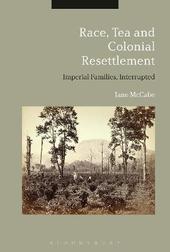
|
Race, Tea and Colonial Resettlement: Imperial Families, Interrupted
Hardback
Main Details
| Title |
Race, Tea and Colonial Resettlement: Imperial Families, Interrupted
|
| Authors and Contributors |
By (author) Dr Jane McCabe
|
| Physical Properties |
| Format:Hardback | | Pages:272 | | Dimensions(mm): Height 234,Width 156 |
|
| Category/Genre | Colonialism and imperialism |
|---|
| ISBN/Barcode |
9781474299503
|
| Classifications | Dewey:306.8743208991411 |
|---|
| Audience | | Tertiary Education (US: College) | |
|---|
| Illustrations |
3 Maps
|
|
Publishing Details |
| Publisher |
Bloomsbury Publishing PLC
|
| Imprint |
Bloomsbury Academic
|
| Publication Date |
4 May 2017 |
| Publication Country |
United Kingdom
|
Description
This book is open access and available on www.bloomsburycollections.com. It is funded by Knowledge Unlatched. WINNER OF THE IAN WARDS PRIZE 2018 By the early 20th century, the ideology of racial distance predominated in British India. This simultaneously threw a spotlight on the 'Anglo-Indian problem' and sent intimate relationships between British colonials and Indian women into the shadows of history. One Scottish missionary's solution was to isolate and raise the mixed-race children of British tea planters in an institution in Kalimpong - in the foothills of the Himalayas - before permanently resettling them far from their maternal homeland as workers in New Zealand. Historian Jane McCabe leads us through a compelling research journey that began with uncovering the story of her own grandmother, Lorna Peters, one of 130 adolescents resettled in New Zealand under the scheme between 1908 and 1938. Using records from the 'Homes' in Kalimpong and in-depth interviews with other descendants in New Zealand, she crafts a compelling, evocative, and unsentimental yet moving narrative -- one that not only brings an untold part of imperial history to light, but also transforms previously broken and hushed family histories into an extraordinary collective story. This book attends to both the affective dimension of these traumatic familial disruptions, and to the larger economic and political drivers that saw government and missionary schemes breaking up Anglo-Indian families -- schemes that relied on future forgetting.
Author Biography
Jane McCabe is a Teaching Fellow in the Department of History and Art History, at the University of Otago, Dunedin, New Zealand. Jane teaches papers on Modern India, Twentieth Century Migration to New Zealand, and Encounters in Global History.
ReviewsThis is a well researched and moving account of the transnational trajectories of families that were made and dispersed by the contingencies of the British Empire and will be of use to scholars of twentieth- century India and New Zealand as well as those interested in race, childhood, migration, missions, genealogical methodologies and oral history. * South Asia: Journal of South Asian Studies * McCabe's remarkable work tells us about the meanings of silence and talking, about frightening and exhilarating journeys across land and sea and lifeways, about the hopes and fears joining northeastern India to Scotland and New Zealand, and to the extraordinary courage of children who made and re-made their lives in an early 20th-century world uneasy with their very existence. This book changes the lives of those who read it. * Charlotte Macdonald, Victoria University of Wellington, New Zealand * From a tiny archive in the foothills of northeast India to the bungalows of British tea planters to the shores of New Zealand and beyond, this remarkable study shows us the scale and drama of empire through transnational family histories. We see the soft power of empire embedded in the hardware of a racialized colonial labor economy; the pain and poignancy of white settlement; and above all, the quiet dignity of a grandmother's story. All told with a combination of rigor and intimacy that makes the stakes of critical imperial history clear to academics and general readers alike. * Antoinette Burton, University of Illinois, USA *
|